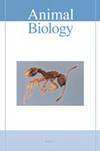Associations between spectral properties, bacteriological characteristics, chlorophyll and zooplankton communities in two north Patagonian lakes
IF 0.9
4区 生物学
Q2 ZOOLOGY
引用次数: 0
Abstract
The Chilean north Patagonian lakes are characterized by their marked oligotrophic or oligomesotrophic status and low abundance of zooplankton species; many of the lakes with oligomesotrophic status are associated with human intervention due to towns on their shores. The aim of the present study was to determine the relations between spectral properties (LANDSAT OLI), chlorophyll and plankton abundances in two north Patagonian lakes: Villarrica, which has two towns on its shores, and Lake Caburgua, which has native forest on its shores. The results revealed that Lake Villarrica has high reflectance in the near infrared, red and green bands, high concentrations of chlorophyll a, the absence of mixotrophic protozoa, and a high abundance of bacterial and plankton, mainly phytoplankton (Chlophyceae and diatoms) and zooplankton. Lake Caburgua, on the other hand, has low reflectance in the same bands, and low chlorophyll concentrations, low bacterial and zooplankton abundances, with the exception of high mixotrophic ciliates and small phytoplankton, and Volvox colonies. The obtained results agree with limnological observations on both lakes, and observations agrees with similar observations of the spectral properties of glacial north Patagonian lakes and of the zooplankton community, and in this scenario, the use of remote-sensing techniques would be a good tool to predict the plankton community in Patagonian lakes.巴塔哥尼亚北部两个湖泊光谱特性、细菌特征、叶绿素和浮游动物群落之间的关系
智利北巴塔哥尼亚湖的特点是其明显的贫营养或贫中营养状态和浮游动物物种的低丰度;许多处于贫中营养状态的湖泊由于其海岸上的城镇而与人类干预有关。本研究的目的是确定巴塔哥尼亚北部两个湖泊的光谱特性(LANDSAT OLI)、叶绿素和浮游生物丰度之间的关系:维拉里卡湖(Villarrica)和卡布尔古阿湖(Lake Caburgua),维拉里卡海岸有两个城镇,卡布尔古亚湖海岸有原生森林。结果表明,维拉里卡湖近红外、红、绿波段反射率高,叶绿素a浓度高,不存在混合营养原生动物,细菌和浮游生物丰度高,主要是浮游植物(叶绿素科和硅藻)和浮游动物。另一方面,卡布尔古阿湖在同一波段的反射率较低,叶绿素浓度较低,细菌和浮游动物丰度较低,但高混合营养纤毛虫和小型浮游植物以及Volvox群落除外。所获得的结果与两个湖泊的湖沼观测结果一致,观测结果与巴塔哥尼亚北部冰川湖泊和浮游动物群落的光谱特性的类似观测结果一致。在这种情况下,遥感技术的使用将是预测巴塔哥尼亚湖泊浮游生物群落的好工具。
本文章由计算机程序翻译,如有差异,请以英文原文为准。
求助全文
约1分钟内获得全文
求助全文
来源期刊

Animal Biology
生物-动物学
CiteScore
2.10
自引率
0.00%
发文量
34
审稿时长
3 months
期刊介绍:
Animal Biology publishes high quality papers and focuses on integration of the various disciplines within the broad field of zoology. These disciplines include behaviour, developmental biology, ecology, endocrinology, evolutionary biology, genomics, morphology, neurobiology, physiology, systematics and theoretical biology. Purely descriptive papers will not be considered for publication.
Animal Biology is the official journal of the Royal Dutch Zoological Society since its foundation in 1872. The journal was initially called Archives Néerlandaises de Zoologie, which was changed in 1952 to Netherlands Journal of Zoology, the current name was established in 2003.
 求助内容:
求助内容: 应助结果提醒方式:
应助结果提醒方式:


